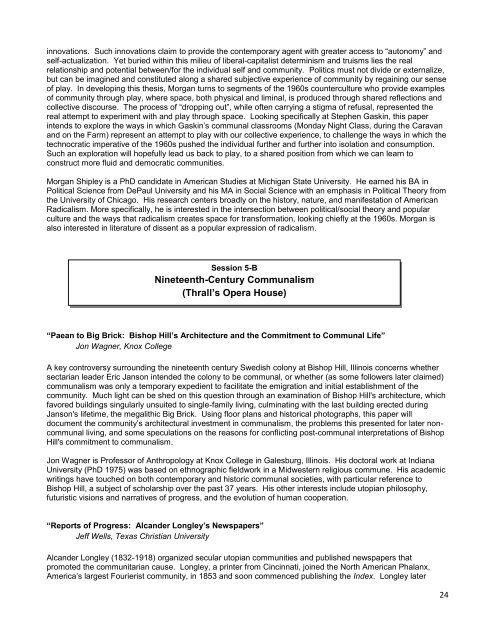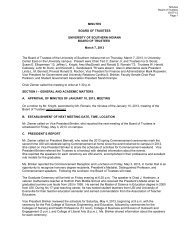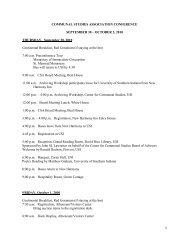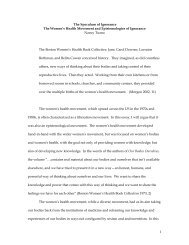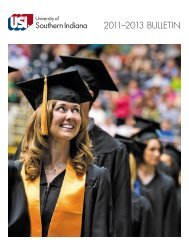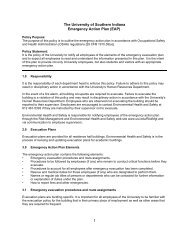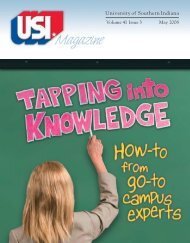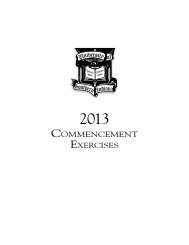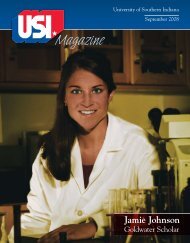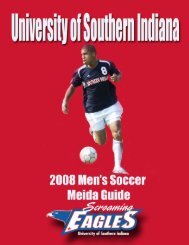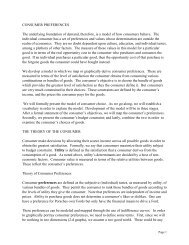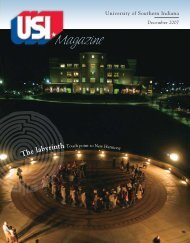Communal Studies Association, 2010 New Harmony, Indiana ...
Communal Studies Association, 2010 New Harmony, Indiana ...
Communal Studies Association, 2010 New Harmony, Indiana ...
You also want an ePaper? Increase the reach of your titles
YUMPU automatically turns print PDFs into web optimized ePapers that Google loves.
innovations. Such innovations claim to provide the contemporary agent with greater access to ―autonomy‖ andself-actualization. Yet buried within this milieu of liberal-capitalist determinism and truisms lies the realrelationship and potential between/for the individual self and community. Politics must not divide or externalize,but can be imagined and constituted along a shared subjective experience of community by regaining our senseof play. In developing this thesis, Morgan turns to segments of the 1960s counterculture who provide examplesof community through play, where space, both physical and liminal, is produced through shared reflections andcollective discourse. The process of ―dropping out‖, while often carrying a stigma of refusal, represented thereal attempt to experiment with and play through space. Looking specifically at Stephen Gaskin, this paperintends to explore the ways in which Gaskin‘s communal classrooms (Monday Night Class, during the Caravanand on the Farm) represent an attempt to play with our collective experience, to challenge the ways in which thetechnocratic imperative of the 1960s pushed the individual further and further into isolation and consumption.Such an exploration will hopefully lead us back to play, to a shared position from which we can learn toconstruct more fluid and democratic communities.Morgan Shipley is a PhD candidate in American <strong>Studies</strong> at Michigan State University. He earned his BA inPolitical Science from DePaul University and his MA in Social Science with an emphasis in Political Theory fromthe University of Chicago. His research centers broadly on the history, nature, and manifestation of AmericanRadicalism. More specifically, he is interested in the intersection between political/social theory and popularculture and the ways that radicalism creates space for transformation, looking chiefly at the 1960s. Morgan isalso interested in literature of dissent as a popular expression of radicalism.Session 5-BNineteenth-Century <strong>Communal</strong>ism(Thrall‟s Opera House)“Paean to Big Brick: Bishop Hill‟s Architecture and the Commitment to <strong>Communal</strong> Life”Jon Wagner, Knox CollegeA key controversy surrounding the nineteenth century Swedish colony at Bishop Hill, Illinois concerns whethersectarian leader Eric Janson intended the colony to be communal, or whether (as some followers later claimed)communalism was only a temporary expedient to facilitate the emigration and initial establishment of thecommunity. Much light can be shed on this question through an examination of Bishop Hill's architecture, whichfavored buildings singularly unsuited to single-family living, culminating with the last building erected duringJanson's lifetime, the megalithic Big Brick. Using floor plans and historical photographs, this paper willdocument the community‘s architectural investment in communalism, the problems this presented for later noncommunalliving, and some speculations on the reasons for conflicting post-communal interpretations of BishopHill's commitment to communalism.Jon Wagner is Professor of Anthropology at Knox College in Galesburg, Illinois. His doctoral work at <strong>Indiana</strong>University (PhD 1975) was based on ethnographic fieldwork in a Midwestern religious commune. His academicwritings have touched on both contemporary and historic communal societies, with particular reference toBishop Hill, a subject of scholarship over the past 37 years. His other interests include utopian philosophy,futuristic visions and narratives of progress, and the evolution of human cooperation.“Reports of Progress: Alcander Longley‟s <strong>New</strong>spapers”Jeff Wells, Texas Christian UniversityAlcander Longley (1832-1918) organized secular utopian communities and published newspapers thatpromoted the communitarian cause. Longley, a printer from Cincinnati, joined the North American Phalanx,America‘s largest Fourierist community, in 1853 and soon commenced publishing the Index. Longley later24


